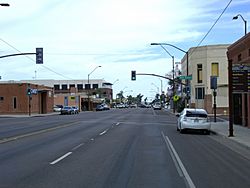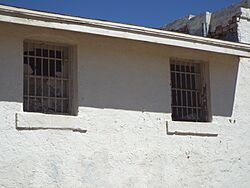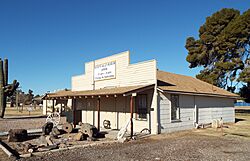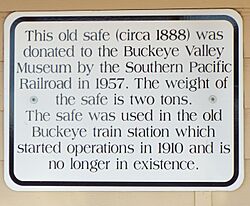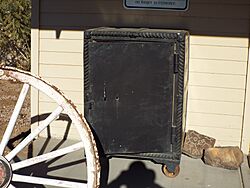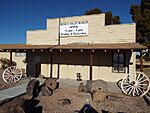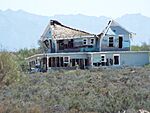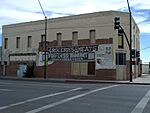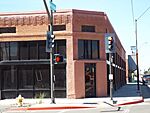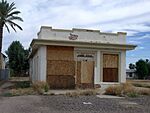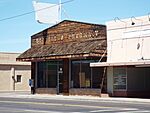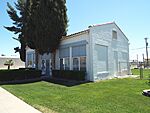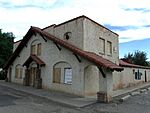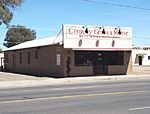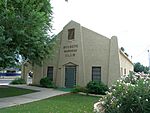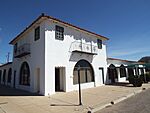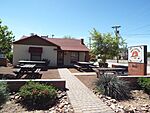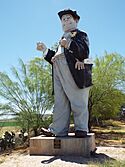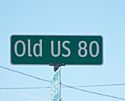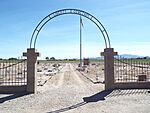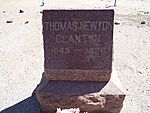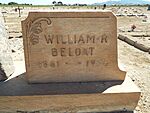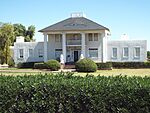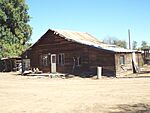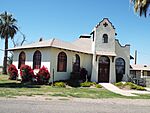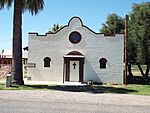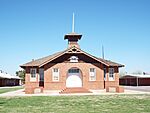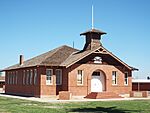List of historic properties in Buckeye, Arizona facts for kids
Quick facts for kids
List of historic properties
in Buckeye, Arizona |
|
|---|---|
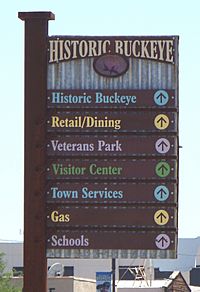
Historic Buckeye
|
|
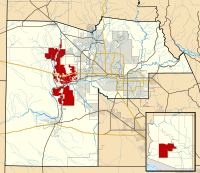
Location in Maricopa County and the state of Arizona
|
This article shows you some of the old buildings and monuments that are important to the history of Buckeye, Arizona. Buckeye is a town in Maricopa County, Arizona. This list also includes places in the nearby communities of Liberty and Palo Verde.
Long ago, the Hohokam people lived in the Buckeye area. The town of Buckeye officially became a town in 1929. One special building, the Buckeye Union High School A-Wing, is even listed on the National Register of Historic Places. This means it's recognized as a very important historic site.
Contents
Buckeye's Story: A Quick Look
Buckeye is in a hot desert area. The Hohokam, a Native American group, lived here first. The first European settlers were Thomas Newton "Newt" Clanton and his family. They came from Ohio.
They needed a way to get water to their farms. So, the Buckeye Canal was built in 1884 by Malin M. Jackson. Newt Clanton helped build part of this canal. William "Bob" R. Beloat also helped start the Buckeye Irrigation Company. The canal was named "Buckeye" because Ohio is called "The Buckeye State."
In 1888, Clanton, Jackson, and William "Bucky" O'Neill planned the town. Jackson first named the town "Sidney." But in 1910, the town's name was changed to Buckeye. It became an official town in 1929.
An old, important road, U.S. Highway 80, goes through Buckeye. This road started in 1846 and was one of the first roads in Arizona. It went from Yuma to Buckeye and beyond. The highway was renamed Arizona 80 in 1989.
In 1942, during World War II, the United States Army Air Force built an air base in Buckeye. It was called Luke Aux Field #5. After the war, it became the Buckeye Municipal Airport. The airport named its airfield after Ensign John C. Butler. He was a brave Navy pilot who received a special award after the Battle of Midway. You can still see some World War II aircraft and vehicles at the airport.
The Buckeye Main Street Coalition started in 1986. Their goal is to protect and improve downtown Buckeye. It's important to save old buildings before they are lost forever.
Other areas in the Buckeye Valley, like Liberty and Palo Verde, also grew around the same time. William "Bob" Beloat helped start the community of Liberty. The Palo Verde area was settled in 1886 by John G. Roberts. He helped build canals and was a deputy sheriff. The Palo Verde Baptist Church, built in 1890, is one of the oldest buildings still standing there.
Historic Places You Can See
Here are some of the historic buildings and places you can find in Buckeye and the surrounding areas:
Buckeye Town Buildings
- The H.E. Kell and Co. General Merchandise Building – This building was built in 1890. It used to be a saloon. Today, it is the Buckeye Valley Museum.
- The Benson/Raney House – This house was built in 1895. It is no longer in use.
- The Joslin Building – Built in 1909, this building has been a hotel, a pharmacy, and a grocery store. It is considered historic by the Buckeye Valley Historical and Archaeological Society.
- The Ware Building – This building was built in 1910. The Buckeye Valley Bank was once located here.
- The Old Courthouse and Jail – Built in 1912, this building has been many things. It was a hospital, a school building, a library, and a food bank. You can still see the original jail bars on the windows!
- Buckeye Pharmacy – This building was built around 1920.
- Buckeye Union High School A-Wing – Built in 1925, this part of the high school is very important. It was added to the National Register of Historic Places in 2009.
- Roosevelt Irrigation District Building – This building was constructed in 1929. The Roosevelt Irrigation District has used it since it was built.
- West Valley Academy – Built in 1930, this building was first used as a church. It is also considered historic.
- The May Building – Also known as the "Urwiller Building," this was built in 1931.
- Buckeye Women's Club – This building was finished on June 6, 1935. It is listed on the National Register of Historic Places.
- Ganley's Funeral Home – Built in 1939, this building once held the offices for people planning a new town called "Valencia." But Valencia was never built.
- The Millstone Café – This cafe was built in 1944. It was a popular spot for people during World War II.
- Hobo Joe – Hobo Joe is a 25-foot-tall statue made in 1965. It used to be in front of a meat store. The statue has been fixed up and is now in a new location.
- 1888 Safe – This old safe was once used in the Southern Pacific Railroad Station in Buckeye.
- Old Highway 80 – This is a historic road that goes through Arizona.
- Buckeye Municipal Airport's John C. Butler Memorial Field – This airport used to be a military air base during World War II. You can still see some old planes from that time here.
Liberty Community Buildings
- Liberty Cemetery – This cemetery started in 1885. Many of Buckeye's first settlers are buried here. This includes Thomas Newton Clanton, who founded Buckeye, and William "Bob" R. Beloat, who helped create the Buckeye Canal.
- Old Spain House (now Nardini Manor) – Joshua L. Spain was one of Buckeye's first settlers. He built this house in 1886, and it was updated in 1912.
- Old Farm House – This old, empty farmhouse was built in 1900 on Joshua L. Spain's land.
- The Liberty Methodist Church and Memorial Hall – Both the church and the hall were built in 1903. The church was added to the National Register of Historic Places in 2017.
- Liberty School – The first school in Buckeye was built in Liberty in 1890. It was made of cottonwood. A fire destroyed it, and a new school was built in 1910. This building is still used today for music lessons. It is the oldest school building still in use in Arizona!
Palo Verde Community Buildings
- The Palo Verde Baptist Church – This church was built in 1890.
- The Palo Verde Baptist Church Cemetery – This cemetery was started in 1903. John G. Roberts, one of Palo Verde's first settlers, is buried here. He helped build the canals.
Historic Places in Buckeye and the Buckeye Valley
Here are pictures of the historic buildings in Buckeye and the nearby communities of Liberty and Palo Verde. Only one of these, the Buckeye Union High School A-Wing, is listed on the National Register of Historic Places. Some places have more than one picture to show them from different angles.
| Name | Image | Year | Name | Image | Year | ||
|---|---|---|---|---|---|---|---|
| 1 | Palo Verde Baptist Church | 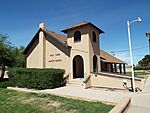 |
1890 | 2 | Palo Verde Baptist Church Cemetery | 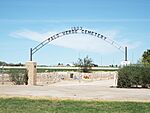 |
1903 |
| 3 | Grave of John G. Roberts | 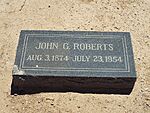 |
(1874–1954) | 4 | Historic Old Highway 80 | 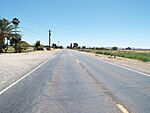 |
1914 |
See also
 | Madam C. J. Walker |
 | Janet Emerson Bashen |
 | Annie Turnbo Malone |
 | Maggie L. Walker |


